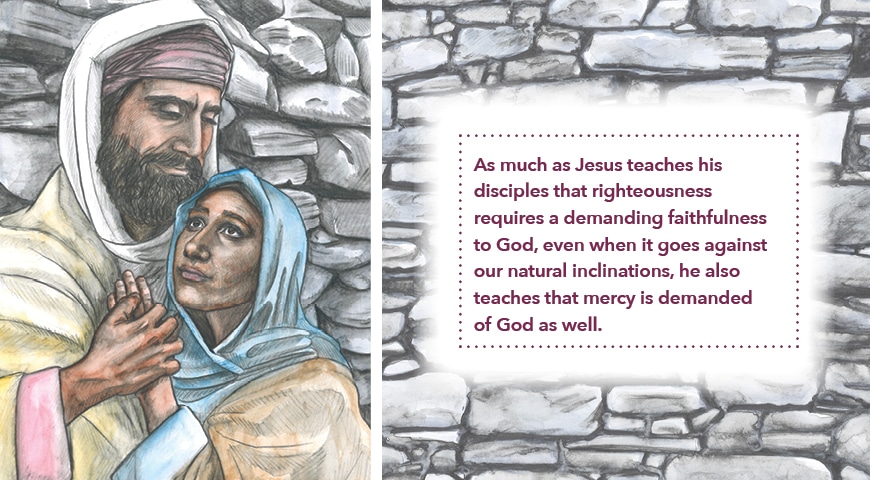Faced with a very difficult decision, Joseph teaches us that righteousness means loving both God and neighbor.
St. Matthew is the only evangelist who has much to say about St. Joseph—and he doesn’t tell us much!
We know that he was a carpenter or craftsman and that he was a descendant of King David. And we know that he was “righteous.” We know this because, at the time Mary conceived the Messiah, Joseph was betrothed to her, but not yet living with her. (When a couple was betrothed, they were considered married, but it was only some months later that the wife moved in with the husband, and they began normal married life.)
It was during this in-between time that Joseph learned that Mary was pregnant. St. Matthew tells us what Joseph did when he heard the news. His response has much to teach us about what it means to be righteous.
The Importance of Righteousness
Catholics don’t seem to use the word righteous much. You rarely hear us talking about striving to be righteous or admiring someone for his or her righteousness. Yet Jesus talks about righteousness quite often. In the Sermon on the Mount (Mt 5:3–12), in fact, he all but dwells on it: “Blessed are they who hunger and thirst for righteousness,” and “Blessed are they who are persecuted for the sake of righteousness.” Later, Jesus says, “Unless your righteousness surpasses that of the scribes and Pharisees, you will not enter into the kingdom of heaven” (Mt 5:20), and “Seek first the kingdom of God and his righteousness” (Mt 6:33).
So why don’t we talk about righteousness very much? I suspect it’s because, at least in our American context, the idea of being righteous can be seen as a negative. Maybe it’s because we unconsciously put the word self before it. Who wants to be known as self-righteous? Or maybe we associate righteousness with a certain harshness and fiery zeal, as we see in caricatures of fire and brimstone preachers whose “righteous indignation” renders them inhumane and merciless.
Whatever the reason, the fact that we seldom talk positively about righteousness, despite the teaching of much of the Bible and of Jesus in particular, suggests that we might have a twisted sense of what this notion is all about. The saints we celebrate this month all hungered and thirsted for righteousness, so it’s a good time to take a closer look at what St. Joseph can teach us about this virtue.
Greg Friedman, OFM, talks about the righteousness of St. Joseph.
A Righteous Decision
Matthew tells us what happened when Joseph learned of Mary’s pregnancy: “Joseph her husband, since he was a righteous man, yet unwilling to expose her to shame, decided to divorce her quietly” (Mt 1:19). This one little sentence, which we can so easily pass over, has a lot to say about what it means to be righteous.
Now for some technical work: The quote above is one translation of the Greek, and depending on which Bible you have, you might see a different translation. Many Bibles have something like,”Joseph her husband, being righteous, yet not wishing to disgrace her . . . .”
See the difference? Being righteous yet not wanting to expose Mary to shame suggests that he showed concern for Mary. It tells us that the desire to protect Mary arose from his desire to be righteous.
For Joseph, righteousness was not just about doing the right thing (as he understood it at the time), but also about doing it the right way. In other words, obeying God’s command and being kind to Mary were not mutually exclusive. Far from it, in fact, since showing compassion toward Mary also fulfilled God’s commands.
When Joseph found out that Mary was pregnant, it naturally didn’t occur to him that Mary remained a virgin and that she had conceived by the Holy Spirit; he only learned this later from the angel. Like anyone else, Joseph would have assumed that Mary conceived in the usual way, and since he knew he wasn’t the father, this meant that she was unfaithful. This may have been very difficult for Joseph to believe, given what he knew of Mary’s character, but there it was: the indisputable fact of her pregnancy. Faced with this, he had to respond.
Loving God and a Neighbor
According to Jewish law, infidelity during the betrothal period was considered adultery, and Joseph was required by divine law to divorce Mary, or “send her away.” In making the decision to do this, Joseph was being righteous and obedient to the will of God. He was, in other words, fulfilling the commandment to “love the Lord, your God, with all your heart, with all your soul, and with all your mind” (Dt 6:5; Mt 22:37). Jesus would later teach his disciples that obeying God’s commandments is an expression of righteousness.
While Joseph was required to terminate the betrothal and send Mary away, he still had a choice to make. He could have made the whole affair very public, perhaps out of revenge or a strong sense of “justice.”

Artwork by Jessie Wagnon
In doing so, he would not only have exposed her to public shame, but also possibly to death by stoning (Dt 22:21–24 and Jn 8:4–5). Joseph decided not to do this. Instead, he wanted to minimize the damage to her as much as possible by dealing with the situation discreetly.
Despite what some translations may say, this act of mercy was not despite Joseph’s righteousness. It was an expression of it, every bit as much as was his fidelity to the command to send Mary away. Joseph knew, as all good Jews knew, that God commands that we love our neighbor as ourselves (Lv 19:18; Mt 22:39). Joseph, because he was righteous, knew that being true to God meant sending Mary away, but he also knew that God demands charity. A few years later, St. Paul would urge the Ephesians to “grow in every way into him who is the head, Christ,” precisely by “living the truth in love” (Eph 4:15). This is righteousness.
Being Righteous Is Demanding
It must have been very hard for Joseph to make the decision to divorce Mary, but given what he knew at the time, there was no other course of action. Joseph knew that a righteous person does not compromise when it comes to the will of God, no matter how difficult fidelity may be. This is why Jesus warns his disciples that they will be persecuted for the sake of righteousness (Mt 5:10). This is why many Jews and Christians have chosen to be martyred rather than be unfaithful to God. And this is why many modern-day Christians have bravely remained faithful in the face of relentless social pressure to speak or act in ways that conflict with the Gospels.
Righteousness is often costly, and sometimes that cost involves others. Jesus also insists, “Whoever loves father or mother more than me is not worthy of me, and whoever loves son or daughter more than me is not worthy of me” (Mt 10:37). As much as Jesus teaches his disciples that righteousness requires a demanding faithfulness to God, even when it goes against our natural inclinations, he also teaches that mercy is demanded of God as well. He insists that “judgment and mercy and fidelity” are all “the weightier things of the law” (Mt 23:23).
Joseph knew this, too, and so he chose to send Mary away quietly in the hopes that it would minimize her pain and possibly save her life. Joseph realized, as Jesus would one day teach, that it is blessed to be merciful because it is God’s will that we show as much mercy as we can even when we must do something very difficult. This is God’s way, and so it must be ours too: “Be merciful, just as your Father is merciful” (Lk 6:36).
In this one brief statement about Joseph, who decided to send Mary away without disgracing her, we find the essence of what it means to be righteous. It turns out that righteousness, far from being a cold, calculating devotion to justice, is a warm, faithful virtue that always seeks merciful justice and just mercy.
As we celebrate the saints who have shown us God’s holiness in so many ways, may we be especially grateful to St. Joseph, the righteous man, whose example encourages us to seek always to “live the truth in love” (Eph 4:15).
Two Feasts for Saint Joseph?



2 thoughts on “St. Joseph: Man of Virtue”
Thank you for explain soo well the concept!
wasnt Josepg oblidged by obedience to the law/to God to have Mary stoned to death for adultery or put away? To be righteouss you obey the law/God.